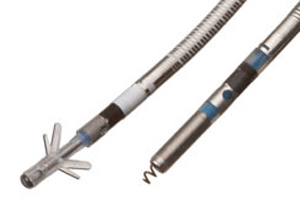
Analysts warned against reading too much into poll results from a 1-day conference of cardiovascular leaders, in which more than half said the ongoing recall of St. Jude Medical’s (NYSE:STJ) Riata defibrillator leads is a more serious issue than Medtronic’s (NYSE:MDT) high-profile pullback of the Sprint Fidelis pacemaker lead.
Due to the small group size of only about 61 health professionals and the potential biases of those in attendance, analysts at Wells Fargo Securities, Credit Suisse and Piper Jaffray cautioned investors against taking the poll results to heart. By the end of the meeting, 58% of polled attendees felt that the concerns about Riata overshadowed Fidelis.
"We would note that Riata Lead Summit attendees may not be representative of the overall electrophysiology (EP) community because the meeting attendees were people who cared enough about the Riata issue to travel to Minneapolis in January," Wells Fargo analysts wrote.
St. Jude officials joined electro-physiologists and physicians from the Minneapolis Heart Institute Foundation and the Mayo Clinic in the Twin Cities Jan. 20 to discuss strategies for dealing with the Riata recall, ultimately concluding that more data was needed before coming up with a blanket strategy on how to manage patients with the devices already implanted.
The FDA slapped the St. Paul, Minn.-based cardiology device maker with a Class I recall for the Riata leads in December, after the company said they failed more frequently than previously reported. St. Jude recalled the Riata leads after receiving reports of high rates of "insulation abrasion," which occurs when the leads’ wires poke through their insulation.
Friday’s meeting was closed to outside observers, including journalists, analysts and officials from other companies, but editors at CardioBrief obtained meeting notes from Cincinnati electrophysiologist Dr. Edward Schloss.
A poll taken at the start of the summit found that 35% of the docs felt that the Riata recall posed a "worse problem than Fidelis," Schloss wrote in a tweet from the meeting. By the end of the day, that figure grew to 58%, but the early departure of some attendees may have weighted the results.
"Even if everyone in the room voted on this topic, the sample size was extremely small for truly understanding overall market sentiment," St. Jude spokeswoman Amy Jo Meyer wrote in an email to MassDevice. "While we don’t have information on how many audience members actually participated in both surveys, we have heard from attendees that a significant number of meeting participants left the meeting before the second vote was taken."
By the end of the summit, 44% of polled attendees were concerned enough about the Riata recall that they wouldn’t opt for St. Jude’s Durata lead in its stead, despite the device’s clean status on the market. That number had grown from 41% who said at the beginning of the day that they would not implant Durata leads, Schloss Tweeted.
"The Durata lead continues to demonstrate excellent performance by any measure," Meyer told us. "We have ongoing prospective, actively monitored registries examining the performance of our Optim/Durata leads, representing 10,836 patients enrolled at 292 sites, with over 5 years and 24,000 patient-years of data."
The Durata device has features designed to to reduce tensions that may result in exposed wires, and features a more abrasion-resistant insulation, Meyer added.
"During the more than 5 years it has been on the market, the Durata lead has continued to meet our very high expectations in terms of safety and reliability," she said.
Analysts at Credit Suisse warned against reading too much into the poll results, writing that summit attendance was likely skewed toward those with heightened levels of concern over the Riata recall, as well as those who prefer Medtronic leads to begin with.
The meeting was organized "to develop a consensus regarding the management of patients who have these leads," but the common theme at the meeting was one of uncertainty.
The risks of insulation abrasion aren’t fully understood, according to St. Jude, but the malfunction can cause an interruption in the cables’ ability to sense rhythm problems in the heart, possibly preventing needed shock therapy or causing unwanted shocks. But not all patients with externalized conductors experience electrical malfunction.
Two patients died and another suffered a serious injury when surgeons attempted to extract the exposed leads, St. Jude said in its recall notice.
While being compared to Medtronic’s Sprint Fidelis, which was implanted in an estimated 268,000 patients at the time of recall, the Riata recall affects far fewer patients. St. Jude estimates that there are about 79,000 Riata and Riata ST devices still active in patients, according to a press release.
The Riata defect, however, "is a very complex one," according to Dr. Robert Hauser, who co-directed Friday’s meeting, TheHeart.org reported.
Hauser, a well-known figure in cardiology circles, is a senior cardiologist at the Minneapolis Heart Institute at Abbott Northwestern Hospital. He said the issue with the Fidelis leads was "much more straightforward" by comparison, according to the website.
"With Riata, there are a lot of variables, and I think we’re going to need more data to understand how best to manage patients than we usually need in a recall situation," Hauser said.

